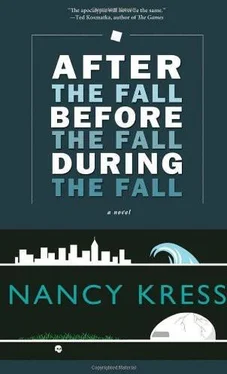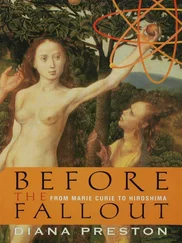Pete heard McAllister’s voice in his head, “Not that language, Pete. I know Darlene uses it but it’s not a good example for the kids.” Fucking bastard . The beautiful, beautiful girl was talking about Pete with the same words Pete talked about Tesslies.
For the first time, he thought about the people left behind when he took their children. How they must feel.
Why hadn’t he ever thought about that before? Why hadn’t McAllister made him think about it? Did Caity or Ravi or Jenna or Terrell? Maybe Jenna did. But Pete had only thought about getting back home safely with the Grabbed kids, about how important it was to restart humanity.
Well, it was! And that was how McAllister always said it. Restarting humanity and saving the Grab children from the Tesslie destruction of the Earth. It was a heroic thing to do, and Pete was a hero for doing it.
The girl on the other side of the pantry door threw something hard against the kitchen wall and again slammed the screen door, screaming, “Mom! Dad! Where the fuck are you!”
Still the baby slept. Pete felt around again on the pantry shelves. He found another package of something, then yet another. Then the Grab caught him, and he was back on the platform with the slumbering baby, two packages of penne pasta, and a loaf of whole wheat bread with rosemary and dill.
“Oh!” Tommy cried. “A baby!”
Everyone clustered around the platform to greet him and take the infant, and even Caity smiled at him. Even Darlene. Pete smiled back. Jauntily he jumped down and handed the baby to McAllister.
Behind him, the Grab platform brightened again.
Just past midnight Julie, seated in front of her computer, put her hands to her face and pulled at the skin hard, trying to fully wake herself up. Today—no, yesterday—was her thirty-ninth birthday. Jake had called from Wyoming. Linda, in the midst of packing her family for Winnipeg, had dashed over with a chocolate cake with a mini-forest of candles. It had been a good day and Julie should have been in bed reliving it in dreams, but instead she’d sat at her computer for four and a half hours, flipping between news sites and screens full of data.
She almost had it, the right algorithm.
She could smell it, tantalizing as apples in October. But this was not autumn and this particular apple evoked Snow White’s Wicked Witch, Alan Turing’s cyanide-laced fruit, the serpent in the Garden of Eden.
God, she was beyond tired, or her thoughts wouldn’t turn so metaphorical. It wasn’t as if there weren’t enough to fear without figurative exaggeration.
Three more data points. One she felt certain about: the kidnapping in Vermont on the night Alicia was born. A three-year-old boy had vanished from his bedroom while his parents were out at a party. Local cops had his babysitter, a Dominican woman who barely spoke English, in custody. She swore she had been asleep on the living room sofa when the abduction occurred; undoubtedly they assumed she was lying. Julie knew she was not.
The other two data points were more uncertain. A break-in in a garden shop in Massachusetts, no forced entry, the cash box untouched. The usual bizarre collection of goods had been taken: rakes, seeds, wind chimes. And yesterday’s incident, the kidnapping of a Maine infant who was supposedly being watched by her teenage sister while the parents strolled on the beach. No trace of the baby girl had been found, but the whole thing so closely resembled a set-up that even the local cops were suspicious, regarding the sister as either a suspect or a scapegoat; Julie couldn’t tell which. Could be a significant, could not. The location fit with her current algorithm, but not so closely if she didn’t include it as a data point to create the algorithm in the first place, which was the kind of thinking that drove mathematicians crazy. And when had she started thinking of a lost child as a “data point”?
She had to go to bed. Just one more scan of breaking news. And there it was:
SCIENTIST ARRESTED FOR SECURITY BREACH
Dr. Geoffrey Fanshaw, Biologist,
Believed Connected to
Unspecified Terrorist Activity
The article said nothing much. It didn’t have to. Julie, all exhaustion banished, ran into her bedroom and started packing.
Two Grabs right in a row, then nothing for a few days, then another Grab for Caity.
They’re playing fucking games, ain’t they,” Darlene said. “With our lives!”
“Not yours,” Caity answered spitefully. “ You never have to go.” She was disappointed with the results of her Grab. She’d found herself in a strange, small store for twenty-two minutes and had not known what to do. There were no shopping carts, and anyway she was afraid of this store. She hadn’t said that, not even later, but then Caity didn’t ever admit fear. Still, Pete knew that’s what she’d felt. She hadn’t wanted to touch anything, but neither did she want to come back empty-handed and anyway, she said later and in a strong temper, “Who knew what the fuck McAllister was going to want?” So she yanked some zippered carrying-bags off a shelf and made herself stuff things into them.
“Gerbils?” Eduardo said, astonished. He and Tommy happened to walk by the Grab room just as Caity returned.
“That’s what they had!” Caity was near tears. “Get McAllister! Never mind, I’ll go myself!”
“Wow, a puppy!” Tommy cried, unzipping a bag with mesh sides.
The Six had never seen gerbils before. Only Terrell, Jenna, and Pete had seen dogs during Grabs, and the one Pete saw had tried to kill him. He didn’t much like the puppy, a small brown-and-white creature with floppy ears. It barked and shit everywhere and chewed up any shoes left on the floor. But everyone else thought it was wonderful, cute and cuddly. Tommy named it Fuzz Ball.
The gerbils were kept in their own room, with an old blanket that McAllister wearily ordered to be torn into strips. The gerbils then finished the job. Unlike the puppy, which had to be coaxed to eat mashed-up soy and only did so when it got hungry enough, the gerbils ate the vegetable crops happily. But their room smelled and had to be cleaned out every day, and Pete couldn’t see the point of them.
“Wait,” McAllister said. “Something is going to happen, I think.”
“What?” Pete said.
“I don’t know.”
“Is it because of what I saw?”
“I really don’t know.”
She didn’t seem to know much. And once, Pete had thought she knew everything!
Two of the gerbils died the day after Caity brought them back. Pete hoped the rest would die, too, and maybe even the puppy, but they didn’t. The gerbils ate and smelled, the puppy raced around and barked and chewed, the babies wailed.
“A regular madhouse, this,” Darlene muttered.
Ravi went on a Grab and returned with yet another large load of objects on yet another large rolling cart. “Look! Look what I got!”
Bundles of tough, heavy cloth that Pete thought would be poor blankets: too uncomfortable. However, it turned out they were not blankets at all. Eduardo let out a whoop such as Pete had never before heard the quiet man make. Eduardo sat on the floor and did things to one of the bundles and it sprang into a little cloth room .
“A tent!” Tommy cried, and crawled inside.
McAllister leaned against the wall, her hand on her belly, and stared at the “tent.”
Eduardo said to McAllister, “Five-pole four-season Storm King. An earlier generation of these is what we used to use on field expeditions in the mountains, when I was a grad student in botany.” Pete didn’t know what a botany or a grad student were, and he didn’t ask. He was too jealous.
Читать дальше












